#AGAIN. DISCLAIMER. NOT DEFENDING THE ENTIRE COMIC. IT HAS ISSUES.
Explore tagged Tumblr posts
Text
like. ok. ok just one example of what i'm talking about so i don't look crazy.
like a lot of people criticized the character of kankri in homestuck because hes like, a parody of sjw tumblr and that's bad, you shouldn't make fun of people who are blogging about social justice. but like. the point wasn't that people who talk about theory are cringe. the point was when kankri said all that but then got mad when another character pointed out women being oppressed. the point was about how self proclaimed social justice men make their coin off of discourse but still refuse to acknowledge things like Misogyny Existing. like those are clearly completely different points with completely different intentions. but like a lot of people missed that point because they literally did not read the entire comic/exchange. but then when you say 'hey i read it and the point was about misogyny in supposedly progressive circles' now you're the guy who actually read all of it
#he is typing#IM SORRY FOR BLOGGING ABOUT THAT COMIC.#and this is just ONE!!!!!!!! example. there are many other things that i do agree were a bit too questionable and crossed the line#BUT it is an effective example of how the content gets misunderstood or misinterpreted because of- shocker- a lack of reading comprehension#and then the misunderstanding becomes widespread and people who see the other founded criticisms lump them in together#as 'why it's bad'#AGAIN. DISCLAIMER. NOT DEFENDING THE ENTIRE COMIC. IT HAS ISSUES.#this is ONE EXAMPLE of things being misrepresented
9 notes
·
View notes
Note
Hey, I was wondering your thoughts on the theory Stephanie is currently going through a negative character arc in main continuity comics? You make very interesting analysis of Stephanie’s character and I thought this theory might interest you.
Ohhh this is so so interesting as a concept thank you sm for bringing it to my attention!!
Quick disclaimer: I’m probably not the best person to answer this. It’s been a while since I read Tynions Rebirth run and I’m probably missing so many things in this post. As always I’m more familiar w post crisis than new52 onwards so if I’m missing some stuff feel free to let me know!!
That being said, I can absolutely see where this idea might come from.
Especially given how Steph’s most recent ongoing is Batgirls (2022), I totally get that. To me, Steph’s portrayal in Batgirls was absolutely a regression in her character.
Both Cass and Steph are portrayed as significantly younger and less mature than their current development should account for (along with a laundry list of small inconsistencies which Batgirls indulges in with absolutely no compunctions)
However I’m also hesitant to use Batgirls as an example, given that Steph’s portrayal in Batgirls isn’t really as much a Stephanie Brown problem per se as it is a Batgirls 2022 problem. As mentioned, Batgirls does this to Cass as well as Steph.
My hope is that the trajectory of Steph’s character will stray from her rendition in Batgirls, much like how Cass is currently getting a (so far) pretty fantastic and heartfelt/serious portrayal in Batgirl 2024. But it’s kinda hard to say for now.
I would garner that it might be a bit harder for Steph to bounce back from her Batgirls regression, given that Batgirls kind of builds off of the bubbly/quirky/optimistic/silly personality that gets established w BQM’s Batgirl 2009, which is Steph’s only solo series and therefore something more engrained/easier to fall back on. (I do have rose tinted glasses when it comes to bg2009 and I will defend it for the record. I like Steph’s characterization in Bg2009. Steph has always been silly at times. We see her use jokes to deflect from heavy situations/alleviate her insecurities super often in Robin 93. The issue is when these are the only aspects of her character which are transferred over, or when she is almost aged down maturity wise like she is in Batgirls 2022, which I don’t think happens in bg2009.)
Additionally, the reboot reset a lot for Steph. It did for a lot of characters, given it was a reboot. For instance we have to see Nightwing move to Blüdhaven again for the ‘first’ time all over again. However this gets especially messy when it comes to characters like Steph and Cass whose histories were completely erased w the New 52.
Characters like Steph and Cass suddenly have no canonical history, for Steph, that’s like two decades of history just erased.
So, when Steph is reintroduced, we get her biggest hits played again. To preserve her character to transfer her over, we have to see her try to ‘spoil’ Cluemasters crimes again for the ‘first’ time, we see her adopt the corresponding ‘Spoiler’ mantle for the ‘first’ time, and in Rebirth, she gets together with and dates Tim Drake for the ‘first’ time. We even have a sort of Steph rebelling against Batman, (despite how this plays out very differently than their post crisis disagreements).
That’s inherently a kind of regression, though obviously not entirely unique to Steph, and since then a lot of Stephanies original history has also since been restored.
However some parts of Steph’s character seem to be stuck on replay, even now.
For instance, the refusal to let Cluemaster leave Steph’s life.
Arthur Brown has shown up in pretty much every book Steph has starred in since (and including) Bg2009 as an antagonist.
While the portrayals vary in effectiveness, the general trend to me this indicates that Steph is being pushed back to her literal roots as a hero again and again, instead of letting her square up against someone new. It’s not like inherently bad to have Steph fight her dad, but there’s only so many times I can see it before it feels like we’re treading the same water and that Steph’s character is a little stuck.
In conclusion?
Hard for me to say Steph is having a negative character arc given she’s hardly had a chance to have an arc (at least not recently).
Batgirls regressed her character, and she was generally regressed early in her reintroduction in the wake of the new52 through how she went through many of her past character beats. Currently, I’m hoping that Steph will have a chance to grow more from her post crisis characterization and largely disregard the worse parts of her Batgirls characterization much like Cass has as of late.
Anyway, thank you again for the ask! Would love to hear other people’s thoughts on this because I’m worried I’ve missed something stupid obvious. If anyone has heard more abt this theory and would like to elaborate I would love to hear it!!
#sorry if this was heavy in batgirls hate#like I probably meant it but still#sometimes I wonder if I’m coherent on here. if this makes no sense ignore me#answered asks#stephanie brown#stephanie brown meta
21 notes
·
View notes
Text
Headcanons for ADHD characters Masterlist
I was asked for this a while ago and I feel this is a good discussion subject because the canon representation for ADHD is kind of abysmal and is often a caricature or a joke.
usual disclaimer, I'm not a therapist, this is not a diagnosis tool, just for fun, etc etc...basing this on my own experience/knowledge with ADHD and meeting a lot of ADHD people IRL. I'm going off the main symptoms first (inattention and/or hyperactivity, restlessness, impulsivity, problems with emotional/focus regulation, daydreaming, messiness, hyper-focus, fidgeting etc) and then looking at character traits that are not a necessary symptom but often associated (substance abuse and addiction, need to please, sensitivity to rejection, compassionate and creative, thrill seeking, very imaginative, charming and witty or withdrawn and shy or angry and irritable, whimsical and fun and a bit child-like, out of the box thinker, self esteem issues, unstable life, comorbidity with anxiety and depression, very intense feelings, functions better with adrenaline/in an emergency, disregard for rules and problems with authority OR extreme compliance, codependency, perceived as weird, clever in an atypical way, problems in school, extremely good at one specific thing, etc)
Also I found this list with actual canonical representation
BOOKS :
The 'fits to a T so I'm seeing it as my personal canon' list :
note : doesn't mean that the authors actually meant to create representation but it's very likely they at least got inspired by people who did have ADHD (even when the diagnosis itself did not exist) and explained it with 'it's just their personality' OR the story happens in a setting where the label doesn't exist as such. also not meant to be exhaustive.
- Helen Burns (from Jane Eyre by Charlotte Brontë) One of Jane's school friends from the start of the novel, fits the inattentive type to a T : she can't seem to focus or learn her lessons, is constantly daydreaming, describes herself as messy and careless, forgets rules, and is easily distracted. She talks constantly about her own 'defective nature' and seems very sensitive to criticism but incapable of changing. She doesn't defend herself against the nuns' harsh punishments as she thinks she deserves them. She's presented as kind-hearted and compassionate, almost too good for this world, and hyperfocuses on her faith. Apparently sb even wrote an academic article on this. She dies so it's not super fun representation but it is interesting to see in an older book, to push back against the idea that ADHD was invented yesterday by Big Pharma lol.
- Grantaire (from Les Miserables, Victor Hugo) Part of the student revolutionary group Les Amis de l'ABC and resident skeptic, does not believe in the cause but is fixated on the group's idealistic leader (and yeah it sounds very gay, they die holding hands, there is a lot of Symbolism). He spends his time ranting about things that are only vaguely connected, is described as brilliant but incapable of sticking to any one profession or hobby, is an alcoholic, has a creative streak (was a painter at some point), likes wandering around the city, has massive self-esteem issues and is a general mess but does seem to care about his friends. This is not a very flattering portrayal as Grantaire is described as morally deficient but again, interesting in an old book. ADHD!Grantaire is a popular take in the modern fandom (i was in it before I was diagnosed it brought up a lot of Things) and it's very cathartic to see him get actual therapy in fic lmao.
- Luna Lovegood (from the Harry Potter series) JKR sucks but this is probably the most high profile case of a possible inattentive ADHD character so I didn't want to leave it out. She's a daydreamer, she is a big space cadet and seems to live in her own world, she has a very out of the ordinary sense of style, she's bullied for being weird, but she's also very kind and perceptive and cares a lot about her friends, and good at coming up with out of the box solutions. I wouldn't call it good representation, she's described as a wacko whom a lot of characters find cringeworthy but she's also pretty heroic, so. And she does seem to hyperfocus on magical creatures. Plus her father could also have it (and it runs in families).
- Jasper Fahey (from Six of Crows duology, Leigh Bardugo) Part of a young group of thieves with a heart of gold, he's a charmer and a compulsive gambler who quits college and incurs debts so massive he stops talking to his father out of shame. He's also an extremely talented sharpshooter and the scenes where he describes how the whole world slows and the rush of adrenaline when he is shooting sound like hyperfocus to a T. He's a loyal friend but also quite dependent on Kaz, the leader of the group, to keep him in line. He's witty, messy and he likes danger. His boyfriend later in the series, Wylan, is dyslexic and the way they learn to accommodate each other's issues honestly makes them one of my favorite couples ever. I need to reread these books and I am so stoked for the series I hope they do Jasper justice.
- Julian Diaz (from Cemetary Boys, Aiden Thomas) Love interest of the book, introduced as the 'high school resident bad boy', energetic motormouth who can't sit still and actually very endearing, has issues in school and gets bored easily, main problem is that he's a ghost...sort of. The whole thing was very cute and I love that Julian's personality is described as fun and attractive instead of annoying (which is, if you haven't noticed already, a pattern).
- Evie O'Neill (from the Diviners series, Libba Bray) She's a flapper in 1920s New York who ran away from her boring little town to make a life for herself ; she's a party girl and an impulsive thrill-seeker who hates standing still and is always looking for excitement to 'fill the void'. She craves fame and attention and pretty things, she can be a loyal friend but is also frequently self-centered and forgetful, she's street smart, resourceful and very charming and witty. She's also grieving, drinks too much and is definitely depressed. She's obviously meant as an archetype of the era, caught between trauma and excess, but it does come over as very hyperactive ADHD as well. Her powers to read objects also really pinged me as a good metaphor for the ADHD tendency to be overwhelmed by details.
The 'bit more of a reach but there's a vibe' list :
- Emma Woodhouse (from Emma, Jane Austen) Frequently cited as a character with ADHD, I didn't come up with this one but she fits. She's daydreaming, easily bored, has flights of fancy and hyper-focuses on matchmaking, is a bit impulsive and thrill seeking, clever in an unconventional way, described as a bit immature, mix of caring and self-centered.
- Ronan Lynch (from the Raven Cycle, Maggie Stiefvater) Ronan just has Neuroatypical Vibes, even though it's not entirely clear what, and I've seen people label him all sorts of things which is very valid. As for ADHD, he's restless, impulsive, likes to Go Fast and do street racing, he has very strong emotions he doesn't know what to do with, and big self esteem issues esp. at the start, is very all or nothing with people, snarky, drops out of school to be a magic farmer, problems with authority, looks like a scary mean goth but is actually a big softie (but like, with a few people), pulls shit out of his dreams. Is kind of dependent on his best friend at the start too.
- Sherlock Holmes (from the eponymous series by Arthur Conan Doyle) Again a character who has been diagnosed with all sorts of things. The biggest ADHD vibe for me is 'my mind rebels at stagnation' and the way he needs drugs to function outside of the thrill of a case, and the way he hyper-focuses on information he needs to be a detective while completely ignoring common knowledge. Also sort of dependent on his best friend Watson and isn't great at social interactions. Doesn't care much about upholding social conventions either. The RDJ adaptation is the one that has the most ADHD vibes to me.
- Harley Quinn (DC Comics/Movies) Big codependency issues (that's arguably the thing she's most known for) and sadly people with ADHD are often prone to getting into abusive relationships. It depends on the story too but she's very energetic, zany, impulsive, she likes shiny things and bright clothes, she's fun and chaotic and likes to break the rules, she's a criminal but she does seem to have a heart, she's also frequently immature and rash, etc.
What are your headcanons ? I would love to hear if you have some so I can add them to the list. I'll make a TV/Movies list soon.
75 notes
·
View notes
Text
Legendarily Defensive: Editing the Gay Away in VLD
Disclaimer: This meta is a collaboration of the entirety of #TeamPurpleLion. We understand while we do touch on narrative romance, we are intentionally trying to be as ship-neutral as possible, and provide that which we only have evidence for. We encourage the experts in their respective ship-fandoms to meta as they do best on these topics, and we hope this can be a factual basis to springboard from.
In the most recent AfterBuzz interview March 4, 2019, Executive Producers Lauren Montgomery and Joaquim dos Santos revealed in no uncertain terms who, precisely, is responsible for the editing fiasco that resulted in the version of Season 8 presented to the fandom, including explaining to their viewers when the changes were called for, and a heretofore unknown why: the removal of a mlm relationship between two of the male Paladins.
Let’s break it down.

The interview itself is a little very difficult to stomach, especially the latter half. But, the first portion is an unusually open and honest discussion of what went down behind the scenes, and what it meant to the producers. It’s also the place where we’ll be lifting direct quotes from. The hosts of AfterBuzz allow the Executive Producers to have the floor and speak with quite a bit of leeway, and some very curious facts come to light. For anyone interested in the source, the interview can be found on Youtube.(3)
Voltron is a unique case. While much of the fan base may not have been around for prior incarnations of this franchise, it has existed for quite a while.
It originally came from a Japanese show Beast King GoLion. From this show, the robot we recognize from Voltron: Defender of the Universe, was created in 1984. There exists an interview with the Executive Producer of Defender of the Universe, Peter Keefe, as well as other cast and crew on the production of how BeastKing became Voltron.(4)
After Voltron: Defender of the Universe, several other iterations bloomed forth - some in the form of comics, some as sequels, some as reboots. The first series to follow Defender of the Universe was Voltron: The Third Dimension, a CGI-based sequel released in 1998.
While not nearly was popular as its predecessor, it managed to stir up some legal conflict:
“Worse, the Japanese creators of Beast King GoLion — Toei Animation — began saber-rattling. Toei believed World Events had overstepped the boundaries of their 1984 agreement and made the CGI series without buying those explicit rights.
To quash this dispute once and for all, Koplar and crew purchased GoLion outright in 2000. Now they had the freedom to adapt at will. But nothing was in the works.”(7)
As of 2000, Koplar and World Events Productions (WEP) owned all the rights to Voltron. Talk of a live action movie has been in the works since 2005, but with little traction. In 2010, WEP licensed rights for the Voltron franchise to Classic Media (now DreamWorks Classics) (7). By 2011, the animated series Voltron Force was released.
In 2014 Lauren Montgomery and Joaquim Dos Santos approached DreamWorks Animation with the idea of producing a new Voltron show, with the license DreamWorks had recently come to own through their acquisition of Classics Media. In 2016, Voltron: Legendary Defender launched.
It’s worth noting World Events Productions licensed rights to produce Voltron content to DreamWorks Studios. They did not hand over the entire franchise to do with as they saw fit. DreamWorks only purchased the ability to play with the characters and the story in whatever capacity WEP believed would remain on-brand.
Amidst the protests and visceral reaction to the final season of Legendary Defender, many have felt confusion about where to direct their frustrations.
In another post, @crystal-rebellion theorized the symbolism in Season 7’s Episode 4 ‘The Feud’ was actually a very blatant representation of what was going on behind the scenes, and why. (2)
Since the most recent interview, statements from the Executive Producers as well as the host have confirmed this to be an accurate assessment of the situation.
Joaquim Dos Santos says it himself:
"This is not a vilifying of DreamWorks. Any exec we ever interacted with was like, 'Hey, we understand why you want to tell the story, we understand where you're coming from. It's a little bit bigger than that. There's other sort of controlling parties with Voltron, which makes it unique.’ It's not just a DreamWorks owned property, and I think it got logistically really really weird." (3)
Seven times, he specifically mentions the pushback didn’t come from DreamWorks, but from ‘other controlling parties.’ He alludes to some logistical weirdness, the implication being a difference in creative direction, or some dissention from higher up. In fact, the hosts and EPs discuss a controlling IP owner eight times in the course of one interview.
He also says, in regard to the issue of LGBTQ+ representation and Adam specifically:
“Here's where we arrived on this. And we were pointing to things like Overwatch. We were pointing to Steven Universe. They're different scenarios, we were in a slightly different position. We didn't have that position of being the creators of this IP. And we also weren't a video game that was marketed to teens and above. We for all intents and purposes were started as a show for boys like 6 to 11 to sell as many toys as possible. And that's just like a fact and that's business, and it is what it is.” (3)
DreamWorks is not a platform that markets ‘toys for boys’ (a talking point brought up no fewer than five times) - but World Events is. President Robert Koplar himself states his target demographic is boys and their dads in Episode 12 from the Let’s Voltron podcast not once, but twice. (5)
The EPs confirm as much with their recent statement in the March 4th ABTV Voltron interview(3) that the possibility of a male paladin’s replacement was greenlit until the IP holder learned the male paladin was to be replaced with Acxa, a woman. This kind of sexist hypocrisy goes as far back as 1984 with Allura being spanked in front of her own team in one episode(11) and tied to a chair by them to prevent her escape in another(11). The 2003 Devil’s Due comic shows Lotor, who looks to be no more than five, witness his mother’s murder via strangulation by his father (complete with an expression of horror on her dead face)(12). Lotor then suffers the same type of non-lethal strangulation in a scene where his father interrupts what the comic refers to as “recreation” with a scantily clad blonde resembling both Lotor’s mother and Allura in a different series(13). All of this takes place in a franchise whose target demographic has consistently been six to eleven year old boys and their fathers. Koplar’s company has made their hypocritical moral stance abundantly clear in Legendary Defender, even going so far as to order the destruction of the entire final season. According to Dos Santos:
“Specifically with Season 7 and 8 we basically held onto Season 7 so Season 8 was like done by the time S7 was dropping. We had like a month left when reaction for Season 7 started coming in, and that was day of the drop. We were in a weird position. To DreamWorks's credit, the tide started changing internally. They came back to us and said, okay we're open to explore this relationship between Adam and Shiro so we were in this weird position where we had all the animation done, we had $0.00 left in the budget in terms of like what we could do and it was like, all right, we know Adam's fate is what it is, do we do this and sort of like take this step knowing that we're going to take some flack? And we decided to do it so we revised the dialogue. You can probably see it in the animation. If you really pay attention it's like, it's literally our editor cutting out mouths and like puppeting different dialogue. The dialogue is pretty vague, it's sort of the best we could do, and that was a process of discussing what we could actually have them say.”(3)
Hold the phone. Taken in context, Dos Santos is explaining the process of DreamWorks giving the showrunners the green light to change the epilogue of Season 8 to give Shiro the unambiguously gay orientation they had written out of Season 7. The problem is, there is no dialogue in the epilogue. Even if we consider the epilogue to consist of everything from “one year later” onward, there is no dialogue for Shiro and another male character that would have to be reworked.
Here is what we think happened: Season 8 was finished in June. The IP owner hated it and ordered it changed at the beginning of July. Those changes included cutting a male/male romance. August came and the fandom melted down over Adam dying. Hoping to avoid a repeat of the Adam debacle, in mid-August DreamWorks came around and offered to let the showrunners put something into Season 8 for more gay representation. By this point the edits to Season 8 were almost complete, the budget was gone, and time was short, so they opted to give Shiro a wedding during the ending, in the epilogue. In an effort to brush off the clear edits to Season 8, Dos Santos mentions the lip movements during the interview but is confusing the making of the epilogue with the rest of the edits.
Indeed, it seems those edits resulted not only in the deaths of the series’ heroine and a childhood abuse victim, but also in the demolition of not just one but possibly two completed romantic arcs. When discussing Allura and Lance’s romance, Dos Santos and Emma Fyffe have this to say:
JDS: I could see the argument where it’s like, it's basic. It's what we've kindof come to expect from okay the guy sort of turned around and-- but I think Lance's arc aside from being with Allura was bigger than the Allura love story.
EF: And Lance's overall story arc I really enjoyed. But again, I think it's this whole idea that we were dealing with this IP that was like "okay, monster of the week, it was like dudes being in love with one hot girl and just macho men with fighting robots and whatever was happening with Pidge".
JDS: Right, yes, yes. (3)
The showrunner himself not only agrees Lance’s milquetoast romantic arc was due to pushback from the IP holder, in discussing the controversy surrounding the main characters’ sexual orientation, Dos Santos inadvertently reveals a major romance between two male paladins was cut.
EF: ...it is important to know that, again, you have this character who is very much your sort of quintessential, like, alpha male.
JDS: That-that was the trope that we were trying to, like, sort of step on was that, you know. I grew up with characters like Duke. To a much lesser degree, he’s a big, giant robot Optimus Prime. The idea of Optimus Prime being with another Optimus Prime was off the table. Like it was a no-go. (3)
If Allura and Lance’s IP-owner-influenced romantic arc is any indication, clearly two main paladins being together was fine. Dos Santos is referring to the inability to pair two male mains.
We don't know for sure, and won't until the original S8 is released. But, we have reasonable cause to believe Keith was intended to be gay and part of the romance that got tanked. When speaking about Keith’s sexuality Dos Santos says:
JDS: Because, I think we didn’t, we didn’t pair him with anybody, you know what I mean. I think we didn’t designate sort of where he stood. We don’t know. It’s-- It’s--
KC: We don’t know
JDS: Yeah, it-- It doesn’t really matter to be honest with you. I mean it would be great to confirm just to make people happy, but, like at the end of the day he is who he is, and leaving it open to interpretation. (3)
Do you hear that? “It would be great to confirm”. Not that it would be great if they could have done it, but if they could have confirmed it. It seems that JDS conceptualizes Keith as having an attraction to men, but he was forbidden from making that fact plain. Again, we have no concrete evidence of who Keith was slated to be with, just that the writers couldn't have two gay male paladins.
The wording of his statements is just clear enough to avoid dishonesty and just vague enough so as not to break contract. Even beyond NDAs, it’s not as if the Executive Producers can speak more directly to these points. We already have evidence of the IP owner’s character in the form of the Voltron Store’s Twitter presence outright lying about WEP and the store being separate entities:

(8) When only a few weeks earlier they had liked a tweet explicitly identifying them as one and the same, while confirming they have the final say over what can be done with the characters:

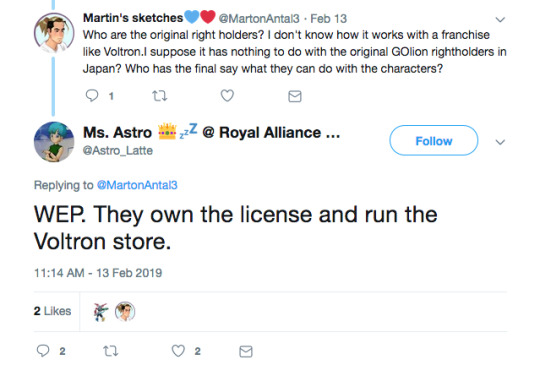
(1)
Before the fandom realized that WEP was behind the edits to S8 of VLD, the information that they owned the license was accepted fact. This excerpt from the Lets Voltron Podcast, Episode 134, is just one example:
(talking about a Voltron reference in Ready Player One)
Host 1: For those of you not in the know, if you think DreamWorks is the all in all for Voltron. Well, World Events Productions is the company that owns --
Host 2: The Voltron intellectual property.
Host 1: Many of you have heard of DreamWorks obviously. They make the show. Well, World Events Productions owns the property and has helped make this new show and all previous shows possible.
LV Podcast EP 134, 5:00-5:30 (6)
Now? Many official avenues are hastily attempting to downplay WEP’s involvement. When reached for comment in February 2019 the LV Podcast claimed that DreamWorks owned the licence.
The official phone number listed on WEP’s website no longer offers an option to connect a person to WEP, instead it offers three options: to directly input an extension, the accounting department, and The Voltron Store. (9)
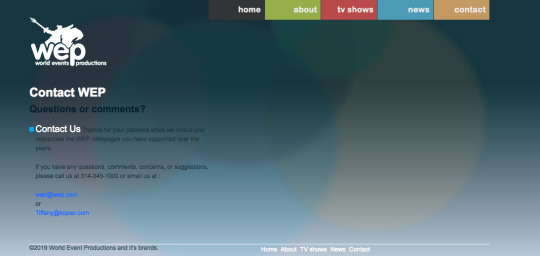
In an effort to prevent fans from contacting them with complaints, WEP have inadvertently made their association with The Voltron Store explicit. Regardless of what the twitter account may claim, they are one and the same company. If these incidents weren’t damning enough, the store has further attempted to engage in a subtle smear campaign by liking tweets from users apologizing for harassment and death threats the store had received over Season 8, when all groups bringing the problems with its forced edits to WEP’s attention have specifically advocated for civil and nonviolent communication. (8)

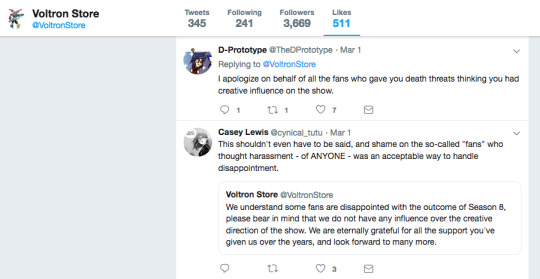
As the story unfolds, one point is clear: Each new interview brings more information forth, repeatedly shining the spotlight on one little office in St. Louis.
WEP LLC is a private company. It has no shareholders, investors, or boards to answer to. It is the sole IP holder of the Voltron brand, and its President is the only person in the entire world who has final say over what can and cannot be done with the characters. When someone says “the IP holder” they are really talking about one man: Bob Koplar.
#TeamPurpleLion is a collective of analysts ( @crystal-rebellion, @dragonofyang, @felixazrael, @leakinghate, and @voltronisruiningmylife )intent on tracking down the who, what, where, how, and why of the destruction of VLDS8. We present sourced & cited commentary, relying on evidence so the VLD community can see what happened behind the scenes.
#Shiro#Keith#Lance#sheith#klance#VLD#voltron#Voltron legendary defender#FREEVLDS8#WEP#World Events Productions#meta#Hate tries to Meta#fubob#TeamPurpleLion#crystal-rebellion#felixazrael#homophobia#Allura
790 notes
·
View notes
Text
All 32 Memorable Scenes from Avengers: Endgame, Ranked (because to leave out even one would do this movie a disservice)
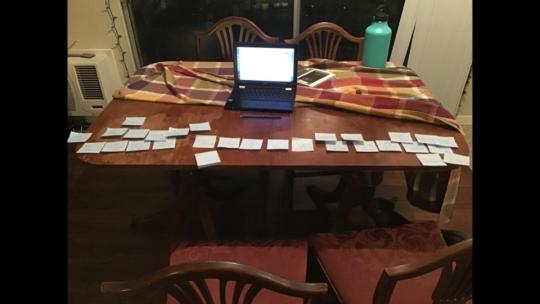
Before we begin, I wish to make three disclaimers:
Literally ALL THE SPOILERS AHEAD, so go see it first. Seriously. It’s fantastic. It’s greater than the sum of all 22 of its parts. It’s a three hour movie that doesn’t feel too long. It’s funny, heart-wrenching, thrilling, and the pay-off we all deserve. I cannot say enough good things about it. Faith restored.
Despite how critical I sound, I didn’t HATE any of these moments. Some just worked better than others.
I had to go to the bathroom three times, so if I’m missing an amazing scene, please let me know in the comments.
And now, without further ado, every moment from this epic epic, ranked from “worst” to best.
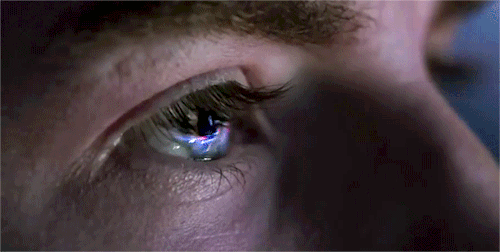
32) Hawkeye for an Eye- Clint going on a faceless-villain killing spree after his family dies is stupidly cliche
31) One too many Cap Speeches- I hope you like your films like you like your pizza: warm and cheesy.
30) Come and Get Your Concussion- Knocking out Quill to pre-steal the power stone was just kinda funny
29) Bruce Rolls a Natural 20- Convincing the Ancient One to hand over the Time Stone felt a little too easy.
28) Picnic Panic- Watching Clint lose his family was rough, but the mom dutifully serving lunch felt cringe
27) Hulk Snaps- While I enjoyed the suspense/uncertainty that follows this moment, it’s weird that a finger snap is actually required to activate the stones powers, except all the times in the movie when it’s not
26) Iron Man Snaps- For such a hugely important moment, the “I am Iron Man” line felt eye-rollingly forced
25) Time Heist is Botched when Loki AGAIN Steals the Tesseract- What a wascally wabbit. You could practically hear the Benny Hill theme in this scene
24) Nebula Shoots Herself- I feel like the “evil” Nebula went down way too easy for the sake of pacing
23) Thor Goes for the Head- Aside from a clever moment in which you think Thanos is altering reality to defend himself but it’s really the Hulk Buster breaking through the floor, this scene is underwhelming
22) My Self-Righteous Suicide- The cliffs of Vormir is a great motif, but wondering which of the two most insignificant Avengers would successfully kill themselves lacked the punch it should have had.
21) Thor Abides- it’s nice that Valkyrie gets crowned the “king” and all, but the new role feels out of character
20) Tony and the Intergalactic Facetime- Paper football is cute, and Tony’s goodbye felt appropriately emotional
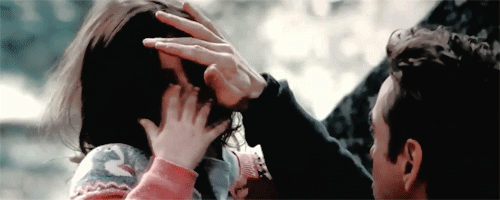
19) Iron Dad- this film’s packed to the brim with father/daughter moments, but “Love You 3000” is a good one
18) Let Me Guess, He Turned into a Baby- who doesn’t love a “working out the kinks” tech montage?
17) Scott Reconnects with Cassie- Checking the wall of the dead, and finding her alive? Instant tears
16) America’s Ass- Cap fighting his past self wasn’t surreal enough to stop him from ogling his own butt. Nice.
15) Tony Invents Time Travel- It had been way too long since we had a “Tony does his homework” montage.
14) Every Time Brie Larson entered the shot like a literal shooting star- I will never get tired of her entrances, especially sporting her new do.
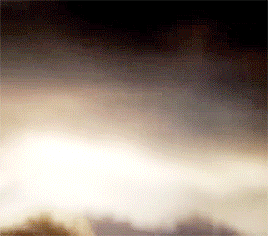
13) The Funeral- The Proof that Tony Stark has a Heart is also proof that we love RDJ even more than we realized
12) That 70’s Show- Giving Tony the father/son talk he always deserved/needed was touching, and Steve’s creepy Jim Halpert impersonation sets the movie up for that incredible final shot
11) Passing the Torch/Shield- Old Cap made me so happy, but passing the mantle to Sam? Even happier. Hope it made racists everywhere uncomfortable
10) Emaciated, Stir Crazy Tony DESTROYS Boy Scout Steve Upon Reunion- Were we really expecting a hug?
9) Professor Hulk Takes a Seflie with Fans at a Diner- the precise moment I knew this movie would rock
8) The Taco- I had a very lousy Monday, but still laughed on three separate occasions when I remembered this masterpiece of silent slapstick.
7) Thor Handles His Mommy Issues- you know a movie’s good when it retroactively redeems DARK WORLD.
6) Elevator Redux- Everything about this scene. The tension. The parallelism. The way Steve defeats the entire platoon with a single, sly “Hail Hydra” is both really smart writing and a nod to fans of the comics & films.
5) The Future is Female- suspend your disbelief and realize that this gorgeous, empowering team-up moment is a giant middle finger to all the dude bros who review bombed Captain Marvel. Plus, there’s a freakin’ pegasus.
4) Cap Proves He’s Worthy- the most thrilling, shocking, satisfying, and important fight in the whole film. My whole theater got chills.
3) Thor Really Lets Himself Go- Fat shaming aside, seeing Thor bicker with kids on Xbox Live and belligerently request a Blood Mary is yet another believable, endearing, & hilarious reinvention of the character. The only thing that would have made it better would have been the addition of Darryl as a third flatmate.
2)The Gang’s All Here- I never thought they could pull it off, but when the resurrected heroes, all several thousand of them, return from the dead to fight Thanos’ army, it ACTUALLY felt surprising, moving, and most importantly, earned. Spider-Man’s instant kill. Black Panther emerging from the Lion King sunrise. That look on Hope’s face. IT’S ALL SO DAMN GOOD!!!
1)The Dance- Maybe it’s because I’ve always been Team Cap, but what a perfect way to close a perfect film. I cried tears of pure joy.
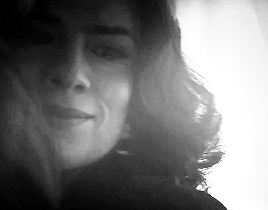
#captain america#tony stark#avengers#endgame#avengers endgame#steve rogers#marvel#marvel cinematic universe#hulk#Robert Downey Jr#Chris Evans#bruce banner#Thanos#spider-man#Brie Larson#Captain Marvel
69 notes
·
View notes
Text
Steve Rogers is a walking contradiction: the anti military soldier
After reading this meta on a gifset about Steve and Tony i got carried away and wrote essentially an essay about the analysis that had been made. and while i agree with the general sentiment of the post, some things didn’t sit right with me. btw i decided to make this my own separate post because this isn’t intended to start an argument or derail the original post, i know it can be annoying for gif makers to have dozens of comments added onto their posts.
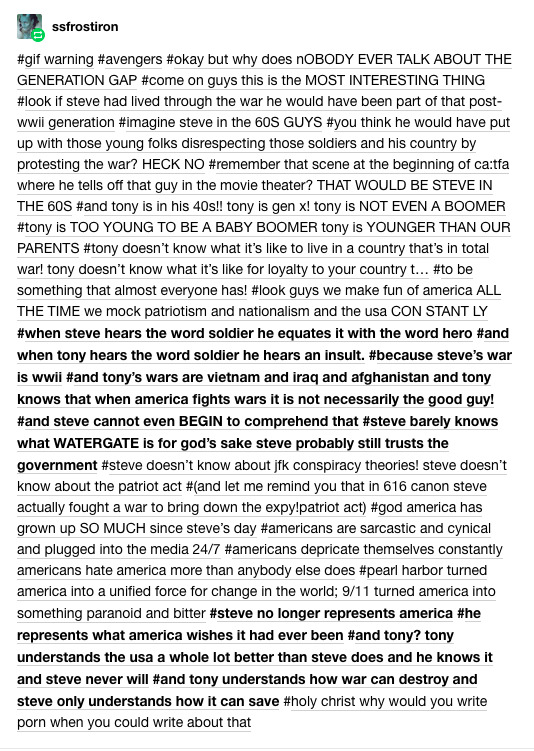
(the meta in question)
ok so full disclaimer I’m not American and I’m not white. i just felt like this analysis was really interesting and when I read it I couldn’t stop all these thoughts that formed in my head, next thing I know I had written all of this in like 30 minutes. I’m not trying to argue or start shit, this is my own personal analysis of Steve’s character and why I don’t agree with some things said above.
First of all, let’s get this out of the way: Steve does not trust the US government. at least not blindly. the fact that he’s still the little shit that had a real problem w authority figures is something they touch upon on catfa a lot. he changed on the outside but on the inside he’s still that idiot punk kid and like, I get what the tags above me are saying but also Steve’s arc is more than that? and let’s not forget this stupid movie was written and directed by thanos Joss “I’m the true feminist ally” whedon so I would take this exchange with a grain of salt. I mean this is the movie that gave us “gOllY tHeRe’S OnLy oNe gOd m'Am” and “sOn oF a GuN” Stephen Rogers which is the most ooc thing I’ve seen since endgame’s Steve. Steve is a fucking potty mouth ffs he’s Irish and a soldier, so that doesn’t even make sense. but anyway, my point is something else, nvm this movie’s portrayal of Steve in general.
I guess we could probably argue all day long abt which Steve portrayal is the most accurate one since his character in the MCU is the one that’s suffered the most at the hands of inconsistent characterization, but I prefer thinking he already WAS someone that was well aware of the horrors of war and how unfair it was to recruit people w lies and the promises of education opportunities and loans for the poor to join the army, because he LIVED that he grew up dirt poor and had to see his mom take on three different jobs to support herself and him, so he’d consider this attempt to bring civilians into the military life by preying on their needs disgusting, he’d be fucking seething with anger. and if he had lived through the 60s (which I think it’s better for everyone involved that he didn’t, can u imagine poor guy would’ve died from the disappointment in what his country had become) I highly doubt he would’ve been the bitter WWII vet that defended Vietnam and shit on the protestors……. Steve would support the citizens’ rights to ask for accountability and demand justice!! even the hippie movement I think he would’ve been ok with when he saw that they were advocating FOR PEACE. that’s why he enlisted on the war after all, to bring the fight to an end and to have Bucky come HOME. I think Steve rogers would be all for peace. I mean, civil disobedience and telling the government to shove it? that’s Steve Rogers’ goddamn ethos. he would be all over that shit.
I agree w op’s tags where they say Steve doesn’t represent America, he represents what America wishes it had been. and I think Steve himself would be well aware he’s the anomaly here, the one that should have been America’s highest ideal. and I think that makes Steve very wary of his own image, anything he endorses becomes what America endorses. Steve rogers isn’t important, Captain America is. but I think Steve’s response here has more to do with his coping mechanisms to deal with loss, rather than coming from a place of “oh we’re soldiers, it’s what we do, we die for our country.” while Tony’s response comes from a place of anger (we are NOT soldiers!!! fuck u old man, i never asked for this!!! coulson didn’t ask for this!!!!!) Steve’s reaction comes from the intrinsic nihilism and dadaism product of his own time. it’s not that he’s minimizing Coulson’s death, it’s more that he’s so used to losing people, the thousands he met that died in European soil, the sick and ill from his ma’s work that died everyday, his own father whom he never even met, that his mechanism is to just. shut down. shrug it off a bit, even. people die. every day. “for believing” means for standing for something, because Steve is WELL aware that people that stand for nothing will fall for anything, and standing for something gives counterbalance to the official agenda. in his eyes, Coulson died not because he’s a soldier and winning the war means being prepared to make a few sacrifices. Coulson died because he chose to believe in something that the majority didn’t care about or even actively sought to destroy (the wsc over fury’s shoulder) and he died because he would not back down from the fight. I can do this all day is something Steve feeds off of because he knows that when you stop getting up from the ground, anyone and anything can strike you down.
but on another note, I get that Avengers happens literally 6 fucking days after he woke up from the ice, he probably had no time to catch up on all the atrocities the US had done on his behalf, or rather on what they said he represented, on the ideal he died defending and the US took and twisted and tore apart until it was no longer recognizable. Steve being a week out of the ice is super sad and to me, the biggest crime this movie did was literally brushing off Steve’s trauma, being riddled with PTSD and shocked from waking up seventy years in the future was not even addressed. at all. this could’ve been easily avoided by setting the movie at least a couple of months AFTER he wakes up. but whatever. After learning of all the shit the US has done, I think Steve rogers would be the first to walk out of there and be like “fuck it, I died for this country and you took it and fucked it up and now young people and people who’ve been killed for protesting your shitty ass decisions genuinely believe I would side with the government. they think I’M the stubborn baby boomer who kisses government boots and would approve of the Gulf War or the Vietnam War or the Central American coups or the war on terror or any of the stupid shit you’ve pulled in the 70 years I was gone!!! YOU MADE ME A SYMBOL FOR YOUR BIGOTRY WHAT THE FUCK”. so he obviously needs time to catch up on all of that before realizing how bad they fucked up his memory and how corrupt the system has become. but Steve’s depiction as a boy scout who believes the US can do nothing bad is inherently wrong and something only this one movie tries to do. no other movie featuring Cap tries to drive the point home that Cap is a goodie two shoes who still believes in american exceptionalism.
CATWS was the gold standard because it truly touched upon the cognitive dissonance Steve experiences coming out of a 70 year nap. the loss he experiences not only for being “the man out of time”, but the true man behind the symbol. heavy are the shoulders that carry the world indeed. and he’s been carrying the entire world on his since he decided to become Captain America. I truly believe the tragedy of Steve Rogers comes from the lack of agency he has over the Captain image, one that has been used to prop up political agendas over and over again. of course, he’s the one that decides to be Captain America as much as he is Steve rogers, blurring the lines between the two men. he could’ve retired, he could’ve adopted a new mantle or even go the old reliable route and try to keep a civilian life away from the superhero gig. but he didn’t. even in the comics whenever he tried to do that it didn’t stick for more than a few issues. so, you know in CATWS he truly experiments what it’s like to pull back the curtain and see the wizard behind it, he faces this disenchantment with the institutions that created him, both SHIELD and the US government. this helps pinpoint the moment he grows super distrustful of politics and agendas, because up until this point he’d only been in the battlefield, and he realizes governments cannot be trusted to make the right decision or even act in benefit of their people.
this way, Civil War does make sense when you see how Steve has grown so disappointed with modern politics that he sees the Sokovia accords as one big red flag, and the first step in a direction that only points toward authoritarianism and civil control. this movie deals with many things poorly of course, but one thing that doesn’t feel ooc is Steve telling the UN to fuck off. He wasn’t around to see the formation of the united nations remember? he literally has no background on what collective security and globalized autonomy are. there’s many things that could’ve been different in CW, but Steve was on the “right” side of the conflict for his character. (i’m NOT saying there’s a wrong and a right side on the Civil war dilemma. that whole thing was badly written so let’s just say it made sense in a hypothetical way). supporting the government in any capacity isn’t a part of Steve’s “thing”, but even when/if he sided with the US govt, he’d never endorse a political agenda that he perceives as “wrong”, knowing it’s hypocritical to do so.
he doesn’t think the end justify the means, which is highly different from Tony’s pragmatism. if Steve and Tony represented opposing philosophical movements, Tony would be utilitarianism and Steve would be deontology. this brings the analysis full circle by pointing out that yes, Tony and Steve operate differently in theory, but in practice they both work for the same objective. Tony is the cynic product of his own doing, he understands how war can destroy and he knows the US has a bad track record of owning up to its own shit. and because of that, he believes that the most good he can do is in his own hands (and because of his extremist way of thinking, he also equates that with being the only one who can do it and therefore, he must, no matter the personal cost). On the other hand, Steve is the idealist product of other’s people efforts, he understands how sometimes war can be the only way to save what is worth saving, but also how it can corrupt even the noblest of men. and because of that, he believes that the most good he can do must be done because other people believe in him, and because by setting the example, others can follow and make the world a better place. (and because of his very stubborn nature, he also equates that with being the ‘tree that must plant itself in the ground and say no, you move’.)
so what I guess I’m trying to say, is that to me at least, saying that Steve Rogers would be in favor of US militarism or that he equates the word “soldier” with hero is a huge disservice to his character. the fact that he’s a fictional character that was first conceived as WWII propaganda is not relevant, because I choose to believe the idea that says fiction stops being the creator’s own the moment it’s out in the world. And Steve Rogers NOW is a different character and serves a different purpose than what he was originally intended to. His entire origin is based on being a soldier, yes, but what makes his character so compelling is the juxtaposition between being a soldier and being essentially opposed to what the US military complex entails. he embodies a lot of american values ofc, like freedom and right of free speech and so, but my take is that he defends this values in a way that is distinctly non American. setting aside discussions of propaganda and the integrity of an art form, i think he’s been written in a way that evokes patriotism without being exclusively american. i mean heck, Steve rogers makes me proud to be from my own country, and inspires me to be better while never reminding me of the fact that he’s from an imperialist super power. Star spangled suit aside, he’s probably a fair enough representation of what one's love for their own country can bring to the surface, no matter which country specifically. i could delve more into that, but this is already getting too long and, since i already mentioned, I’m not from the US and my cultural upbringing is far different from the US. so i’m not sure i could make such a poignant analysis about the military culture and the way it impacts characters such as Steve.
#why tf did i write this#full disclosure i took two adderalls today oop#maybe that's why#steve rogers#marvel meta#mcu#marvel#captain america
22 notes
·
View notes
Text
Leia Organa, INFP

Recently I read a fantastic post by @bestmixtapeintherecorder about how Han and Leia are so often misjudged as an introvert and an extravert, respectively, when it’s really vice versa. This is something I’ve also been thinking about for a long time, particularly with Leia. In MBTI terms, Leia is almost always typed as either an ESTJ or an ENTJ, and that’s never sat right with me. Both of those seem more like typings based on a pop culture idea of who Leia is rather than on the Leia we actually see in the movies and books. While I realize that as a fictional character, the minutia of her personality is somewhat open to interpretation, I think I have ample reason to argue that she’s an INFP instead.
Disclaimer: I myself am an INFP. Maybe this makes me biased. Maybe this means I have unique insight into how an INFP would act when thrown into Leia’s situation. Maybe both! Either way, I think there’s plenty of evidence to back up my opinion. BUT: one of the joys of fictional characters is that we get to project ourselves onto them, and consequently they shape our perception of our own journeys and who we are. So if you prefer an ESTJ Leia or some other type entirely, more power to you. Feel free to ignore this (or argue away to your heart’s content). I’m writing this for everyone else who isn’t satisfied with that typing.
I’m going to be drawing evidence from not only the movies, but also from parts of the new Disney canon like Bloodline and the Aftermath Trilogy, as well as what I see as generally accepted fanon (particularly among fanfic writers). If you’re not into Disney canon, don’t worry — there should still be enough without it to back up my argument.

You may be asking, why INFP? Aren’t INFPs more of a quiet, soft and gentle type compared to Leia, who takes charge and will not hesitate to put you in your place? Truth is, INFPs often get stereotyped as the most cinnamon roll type of all the cinnamon rolls, but this is, quite frankly, wrong. They certainly can act like cinnamon rolls at times (when they’re at their least stressed), often being very kind, tolerant, sensitive and compassionate. But cross their deeply-held values, or get them stressed, and they will wipe the floor with you. In reality, INFPs are the type that looks like a cinnamon roll but will kill you.
I’m going to argue that most of the time we see Leia in the movies (especially in ANH and ESB), she is really stressed. Consequently, we see a lot more of her inferior function, Te, than we would otherwise. This is why people often mistakenly type her as a Te-dom (ESTJ or ENTJ). In doing so, they’re failing to account for the fact that Leia has had/is having a whole lot of super freaking stressful and traumatic things happen to her, which is naturally going to shape how her personality appears to us.
First let’s take a look at each of the INFP cognitive functions and how Leia exhibits them, and then I’ll do some further expounding and comparison with ESTJ/ENTJ.
Dominant Function: Introverted Feeling (Fi)

Leia’s core motivation for everything she does is her values — this is what drives her. Very idealistic, she throws her entire life into championing her cause and fighting for justice, freedom, and everything she believes is right. In the SW Rebels episode A Princess on Lothal, she tells Ezra, “I feel like because I can fight, I have to, for those who cannot.” (Te-doms, on the other hand, while having Fi as their inferior function, are driven more by a need to direct, organize and problem-solve.) While she may be a lot more open-minded on lesser matters, she will rigidly defend her values when they are challenged and can be somewhat black and white when it comes to them.
She doesn’t feel the need to conform. She is strong-willed and stubborn, and can be a bit rebellious, willing even to defy her superiors in order to do what she feels is right. We can see this in the Princess Leia comic when she disobeys General Dodonna’s orders in order to gather and protect the galaxy’s remaining Alderaanians, in Aftermath: Life Debt when she defies Mon Mothma and runs off to rescue Han and help liberate Kashyyyk, in Bloodline when she engages in some questionably legal behavior because she feels her investigation is so important, and of course, in her position as a rebel to begin with.
Additionally, growing up, she sometimes struggled with conforming to what was expected of her as a princess or learning certain things (such as her aunts’ etiquette lessons and politics) if she didn’t think they were meaningful, true to her values and/or herself. Eventually, after talks such as the one she remembers having with her father in the Princess Leia comic (#2), her eyes were opened to the meaning and potential in politics, how it could be used to champion a cause, and she decided to follow in Bail’s footsteps.

At the beginning of Bloodline, Leia is disillusioned by the state of the Senate and wants to quit her role as senator. She tells Han, “Every debate on the Senate floor turns into an endless argument over ‘tone’ or ‘form’ and never about issues of substance.” When she takes action later, she feels much more like herself again, because she feels like she’s doing something meaningful. This shows she’s less concerned about the organization of the New Republic than about defending the values and causes that are close to her heart.
Leia is incredibly passionate. Like all Fi-doms, she has a rich inner world of emotion, though it is sometimes not apparent to others due to her natural guardedness. She can appear cold, but underneath the surface she is anything but. She may be able to analyze her own feelings but have trouble opening up about them to others, except in the occasional outburst. She struggles with admitting her feelings for Han aloud, instead talking about him in the context of her values/the cause (e.g. in the corridors of Hoth — Han is directly asking her to admit her feelings for him and all she can allow herself to say is “You’re a great help to us. You’re a natural leader….”). Later, when confronted by Luke about the truth of her family in RotJ, as @bestmixtapeintherecorder has already said, she shuts down emotionally. She is extremely distressed but unable to open up to Han about everything just yet (she needs more time to process it all inside, first). And yet, throughout the movies, I get the sense that even though she doesn’t always express it, just underneath the surface is a well of deep passion and feeling (which Han can sometimes be pretty good at provoking). I think it is clear that she has a deep emotional fire that both fuels and assails her, and helps drive her in her fight for justice.

Auxiliary Function: Extraverted Intuition (Ne)
Leia chose to follow in her father’s footsteps and become a senator. I doubt she would have done this if she was utterly lacking in Ne, a function that balances the strength of her Fi by helping her to engage empathetically with people and see many possibilities. She is skilled in diplomacy — we see this firsthand in her interaction with the Ewoks in RotJ, whom she is able to befriend and consequently rally to her cause, and throughout the expanded universe (both Disney Canon and old EU). Caring and open-minded, she is able to see and understand multiple points of view (though she may still oppose them rigidly if they run up against the values of her Fi). Her comment to Luke about Han in ANH, “He’s got to follow his own path, no one can choose it for him,” illustrates this. Also, in Bloodline, she is able to acknowledge the perspectives of both Populists and Centrists to some extent, and while she firmly rejects certain Centrist viewpoints, she is willing to seek a compromise for the sake of the bigger picture (her value of protecting the New Republic) when most of her fellow Populists aren’t. She does not dogmatically take a side and stay there unquestioningly. Instead, using her Ne in combination with her Fi, she evaluates all sides of an issue and determines what fits with her values.

She is a good listener, and others may find themselves confiding in her, as Luke does on the way to Yavin, or as Casterfo ends up doing in Bloodline.
Ne also helps her adapt to a situation and be resourceful. We see this in her finding a way out of the detention block through the garbage chute in ANH, her use of the chain that bound her to Jabba to strangle him, and countless other ways.

Fanon usually describes Leia as a broadly intelligent person with wide academic interests and an appreciation for the arts and sciences. While we don’t have a chance to see this side of her in the movies simply because it’s wartime, Ne would make her curious and eager to learn and understand (at least whatever her Fi tells her to be interested in). It would also give her a measure of creativity and a way to healthily channel her emotions, something which she has no opportunity to do while at war, to her own detriment. An INFP’s Ne can also give them a particular skill with words and language, which we see in Leia’s ability (bolstered by the Force) to compose inspiring and persuading speeches.

Finally, her Ne may be a factor in making her particularly adept at certain Force skills. Leia seems to have a profound intuitive connection with her environment, magnified through the Force. She is very sensitive to the ambience of a place, to feelings, and impressions. We see this in her nervousness at Cloud City because something doesn’t feel right, and her sense of having “always known” during her talk with Luke in RotJ. There’s a beautiful passage in the RotJ novel where, as she’s led by Wicket to the Ewok’s village, she has a sudden awareness of the trees and the world around her that fills her with wonder, and a sense of being caught up in the grandness of the universe and the life-force. This not only fits with her Force abilities, but also with Ne.

Tertiary Function: Introverted Sensing (Si)
Si places a lot of weight on personal experiences/memories, lessons learned in the past. It is nostalgic and takes comfort in routine, tradition and familiarity (providing some balance with her Ne, which is more open to new experiences and adventure).
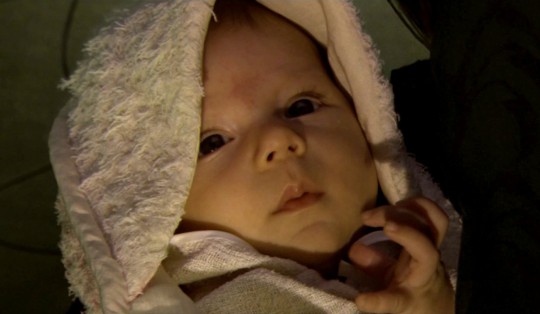
Leia has a good memory; she remembers “images” of her real mother (possibly from a dream). She is also committed to continuing her father’s work and upholding the ideals of Alderaan and the Republic. When she is struggling, she often turns to routine for comfort, losing herself in her work and in her efforts for the cause.
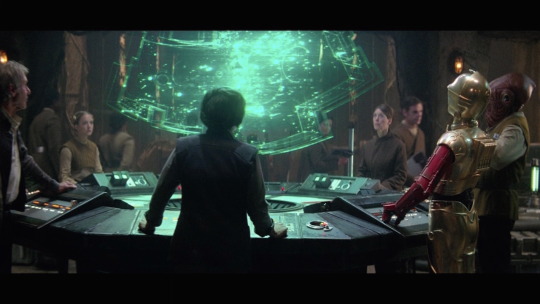
In the Aftermath trilogy, she has trouble adjusting to both her new life post-fighting and the New Republic. She is so used to being able to act when she sees something wrong, but now it seems like there are a million political hoops to jump through that weren’t there before. When faced with a breach in her Fi’s values, she falls back on tradition and, in a sense, never stops being a rebel. Later, she will found the Resistance — once again, it’s a familiar way of doing things for her, coupled with her Fi’s quest for meaning and defense of values.
Inferior Function: Extraverted Thinking (Te)

Leia has been thrust into leadership positions throughout her whole life. As @bestmixtapeintherecorder said, this doesn’t mean that she’d choose it for herself, all things being equal. In fact, in RotJ, we see her taking more of a backseat, and in Bloodline, she only accepts her nomination for First Senator with extreme reluctance. However, when put into a leadership position, she shows herself to be effective and able. Her Te also couples with her Fi to lead her to jump into a debate or fight if she feels her values are challenged.
Like I said earlier, Te is where I think everyone gets hung up when typing Leia. She so clearly exhibits Te that most people assume it’s her dominant function (hence ESTJ and ENTJ). However, throughout much of the movies, Leia is incredibly stressed. Under extreme stress, the inferior function tends to take the lead, though it often comes out in negative ways or as somewhat of a caricature of dominant Te. This is exactly what we often see in Leia, particularly in ANH and ESB. Throughout those movies, she’s lost her home and family, she’s been through torture and trauma, she’s fighting on the front lines in a war, and on top of all that, she’s struggling with her frustration at and feelings for Han. Consequently, she is frequently “in the grip” of her Te. When this happens, she lashes out at others, unleashing sarcasm and biting remarks, becoming more rigid, judgmental, intolerant and even insensitive. Everything becomes even more black and white as the tempering nature of her Ne is gone. She will often seek to gain control of a situation (and thus control of herself, too).

A good example of this is in Aftermath: Life Debt when her stress over Han’s disappearance and her frustration over what she feels are heartless political processes cause her to explode during a meeting with Mon Mothma, Admiral Ackbar, and others. We also see this at the beginning of Bloodline — when faced with Casterfo’s collection of Imperial paraphernalia (which challenges her values and likely also triggers her PTSD), she eventually loses control of her anger, forgets any semblance of tolerance she had previously tried to summon, and lets loose on Casterfo, arguing viciously with him before coldly leaving the room. And of course, we see this throughout the movies in her sarcasm and insults as she takes charge of her rescue in ANH, and in her constant fighting with Han in ESB.
Sometimes, when in the grip of her Te, she may make questionable decisions in the heat of the moment, saying things she’ll later regret or trying to “fix” a situation in a way that won’t fix it at all (for example, kissing Luke in ESB to prove a point to Han that isn’t even true).
By the second half of RotJ, while she is still in a stressful wartime situation, I’d argue that she’s much more relaxed, having Han back and feeling a new sense of determination and purpose. Consequently, we don’t see as much of her sharp tongue, angry outbursts, or need for control.
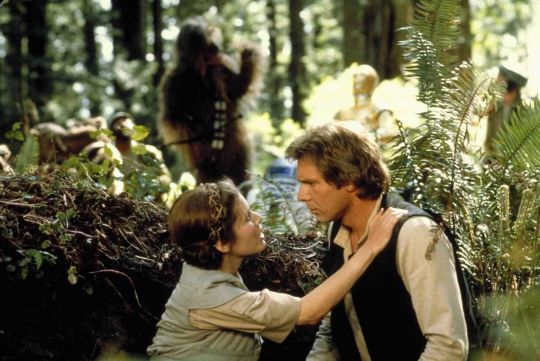
If Leia were an ESTJ or an ENTJ, her behavior would be somewhat different when stressed. An ExTJ in the grip of inferior Fi is less able to think logically or stay organized and efficient, and they will tend to be overcome by the feeling that they aren’t appreciated for what they do. I don’t think we see this in Leia at all during her most stressful moments. On the contrary, she becomes more logical, rigid, and efficient, and doesn’t seem to wallow in self-pity (though she may be very critical of both herself and others).
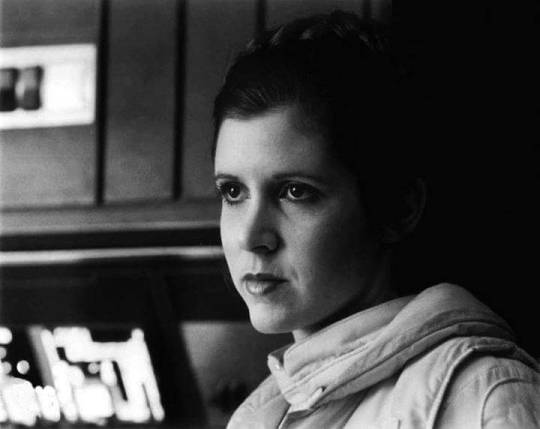
I also think that if Leia were an ESTJ or ENTJ, she wouldn’t be quite as idealistic as we see her throughout the books and the movies. Leia is so clearly driven by her values, by her fight for the cause, and she will and often does push back against what she sees as cold, sterile rules and bureaucracy when it hinders her fight for what she believes is right. An ESTJ or ENTJ would be more likely to see the necessity of those rules and bureaucracy.
Overall, INFPs are passionate, idealistic, caring, empathetic, stubborn, defensive, deeply emotional but closed off, sometimes tolerant and sometimes intolerant, imaginative, resourceful, sensitive, artistic, intelligent, intuitive, critical, nostalgic, intense dreamers who seek truth, justice and authenticity and are driven to make the world a better place. We see many of these qualities in Leia, and the few that aren’t as readily apparent can be easily explained due to the fact that we’re seeing her in wartime/during a time of stress, where those qualities would naturally be missing. This combined with the fact that Leia’s character and actions fit very well with the INFP functional stack, as I’ve already argued, makes me conclude that Leia is best characterized as an INFP.

#Leia Organa#Princess Leia#INFP#MBTI#SW meta#Star Wars#I think I'm right on this and no one will ever convince me otherwise#the furiousness with which I dove into this project kind of shocked me tbh#it was kind of like writing a research paper#which oddly enough I always kind of enjoyed doing?#I guess I really missed it#my analytical side (aka my Ne + Te) is very happy now#anyway here you go#it's probably way too long but hopefully some of you will appreciate it#writing#my SW meta#thoughts#also: *steps on soapbox*#MBTI can be super helpful for characterization purposes and for understanding yourself and others a little better#but people are so complex they cannot be shoved entirely into a box#so I think it's wise to take it all with a grain of salt#*steps off soapbox*
54 notes
·
View notes
Text
An H.R. Study: What Do You Do With a Non-Logical Character in an Otherwise Logical World?
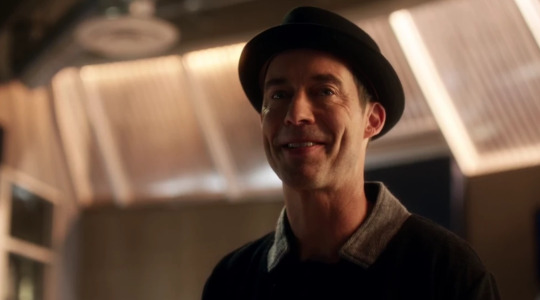
Who’s your favorite Flash character? Mine is Harrison Wells and yes, I mean every Harrison Wells. From Star Trek’s evil Mirror Universe counterparts to the Fringe division learning to embrace their alternate selves, the doppelgänger has long been a beloved trope in Science Fiction, capable of drawing out both conflict and nuance of character — and Tom Cavanagh’s work is no exception. It means that I was (and remain) thrilled to get another iteration of Harrison Well on the show: the quirky and enigmatic H.R.
Now this meta could have easily been a ranty defense of H.R., considering that the other members of Team Flash mostly seem to hate him and, from what I’ve seen, the fandom does too. Which honestly surprises me. I personally find him to be lovable, entertaining, and a breath of fresh air within the story...but hell, no one needs to like the characters I like. This isn’t a ‘my fave is the best!!’ pissing contest.
No, I’m more interested in the question that H.R. represents: What the hell do you do with a non-logical character in a predominantly logical environment?
As a sort of disclaimer, I’m using ‘logical’ here as a nebulous catch-all for the hard sciences/pseudo-science/things that do not fall into the realm of the Humanities. AKA, most of the stuff you find in superhero stories. Because that’s what The Flash gives us: a world where science rules, unquestioningly. It is the source of the protagonists’ power, the means to the antagonists’ defeat, and even when something ethereal like magic is introduced (“Legends of Today”) it’s quickly shuffled out of the narrative because it’s too much of a threat. This results in a set of characters with a (heh) logical, but rather limited skill-set:
Harrison/Harry/Eobard Thawne - All genius scientists with backgrounds in, frankly, whatever the story needs.
Cisco - Mechanical engineer who, as Harry says, “can do anything.”
Caitlin - Bio-engineer capable of solving any medical emergency under the sun.
Barry - Our protagonist, who could have easily been a part of this group purely because of his powers. However, he’s also a forensic scientist and easily keeps up with all the technical aspects of their work.
Wally - A student, but one with incredible mechanical and technical talent.
Jesse - Also a student, though said to have a “genius IQ” and clearly takes after her father in terms of worshiping science.
Julian - Another astoundingly talented forensic scientist.
Hartley - Physicist who was once the “favorite” of Dr. Wells’.
Martin Stein/Ronnie/Jefferson Jackson - Brilliant physicist, structural engineer, and mechanic, respectively.

The main outliers:
Joe West/Eddie Thawne - Police detectives, the former of whose lack of scientific knowledge is often used for comic relief. It’s fine though because they’re still able to back up Team Flash with police resources. They’re “useful” despite not being scientists, and thus their outlying nature is not just tolerated, but looked upon fondly.
Iris West - Journalist, was “useful” in season one when her writing was introducing Central City to the Flash... now though? She’s able to follow the science mumbo-jumbo slightly better than Joe (“Speed-canon, Dad.”) but that doesn’t mean she contributes much. She’s tolerated, frankly, because she’s the main love interest (which is a whole other rant). And don’t get me wrong, I adore Iris, but within the boundaries of this world her contributions are primarily in the form of giving Barry pep-talks and something to fight for. (Again, rant for another time.)
And then there’s H.R.
This is the world H.R. is entering into. This is the team he’s trying to join - one that’s saturated with the logical; the scientific. It’s a group that says loudly and clearly that if you can’t talk particle acceleration or invent a quantum splicer, you don’t belong here. Hell, Cisco says it outright when he complains that out of the entire multi-verse they got the one Wells that (supposedly) isn’t a genius.
I find this absolutely fascinating. I also find it incredibly problematic.
On the one hand this is a golden opportunity for the writers. Look at this change of pace! They have a character who supposedly doesn’t fit, who brings an entirely new set of skills to the table, and that should, in turn, provide new opportunities and complicate what it means to be “useful” in this logical world. If we look at this analytically, we can see that H.R. has already demonstrated a number of astounding talents and characteristics:
He managed to trick the team into thinking he solved the cryptogram (acting skills)
Read through the entirety of the Team’s records and has used that information to achieve his ends - such as getting them all coffee (critical reading, memorization)
When caught admits that he’s working on a book and that he’s produced a number of best sellers (creative writing)
Presents himself as the Team’s “muse” (ability to act as a sounding board for developing ideas, helping to bring out others’ potential)
Trained Wally when no one else would (coaching, compassion)
Built an entire museum within STAR Labs, presumably single-handedly (planning, execution, perseverance)
Is constantly pulling together events and cracking jokes (organization, decorating, entertainment, moral)
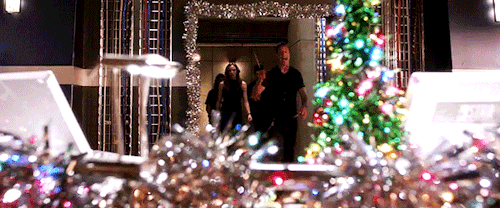
I think this is an impressive skill-set. And yes, I’m admittedly biased. H.R. largely represents who I am—a reader, a writer, a funny sort of person who happens to be completely useless at science—and I was thrilled to see how the writers would fit someone like me into this logical, genius-driven world. What’s sad though is that their answer to the “What do you do with a character like H.R.?” question is apparently, “Nothing.”
Despite a few throw-away lines about how he’s indeed a part of the Team now and Cisco’s fight for him against Gypsy (which can be read as a ‘this is just what heroes do’ action), nobody seems to actually like H.R., let alone appreciate what he can do—let alone explore how his talents might benefit the Team. He’s rarely given credit for the ideas he helps to develop. His (frankly beautiful) acts of friendship are met with consistent disgust and unease—even moreso now that Harry is back on Earth One. Joe once asked him if he had a pathological need to make people like him, which brings up another important issue within superhero narratives: that apparently neuro-atypical people don’t belong there either. H.R. reminds me of a lot of my friends—hyper, anxious, needs to fiddle with things, uses humor and self-depreciation as a defense against horrific insults like someone spitting into your coffee—and the fact that the show neither has the other characters defending H.R. or at least warming to him is incredibly disheartening.
I hope this improves over the second half of this season. I’m not sure it will.
Because I have a bad sense of where H.R.’s story might be going. We’ve had one ‘good’ Wells who was revealed to be bad. One seemingly ‘bad’ Wells who is now firmly on the side of good. Now it’s time to have a Wells who is exactly as he appears, but since The Flash writers don’t seem to know what to do with a creative character in an otherwise logical world, I fear that H.R. won’t be surviving the season. That, in an attempt to make him “useful,” he’ll sacrifice himself for the Team—and then everyone can look back and regret how cruel they were, once he’s safely out of the way.
I think H.R. deserves better than that. I hope I’m wrong. Because he represents a class of character we so rarely see in the superhero genre and I, personally, would like to see a whole lot more of him.
Thanks for reading <3

74 notes
·
View notes